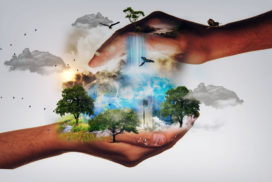
If you are questioned about the facts which are harmful to the environment, the few inevitably expected answers would be the use of plastic bags, more population and increasing vehicles. Thanks to the subject of Environmental Science which has successfully deposited the above-said points in our minds. But environmental degradation is not confined only to this. On the birthday of our Mother Earth, let us explore the minute things that we almost do every day and contribute to the adverse effect on the environment.
- Cleansing your face –
Yes, you read it right. Actually, cleansing doesn’t affect but some particles in the cleaning products do. Used for removing dead skin cells, plastic exfoliating microbeads are terrible for the environment. These tiny plastic products are found in facial cleansers, in kinds of toothpaste and many other cosmetics which helps in cleansing. Microbeads are so small that they pass through the sewage filters and end up in lakes, rivers and oceans. Once there these plastic products contaminate the water bodies they become hard to be consumed by aquatic animals.
Solution: The US government has banned the use of products containing microbeads since 2018. On the same line, companies should manufacture products without microbeads.
- Using Hygiene Products –
An inexpensive and effective foaming agent, sodium laureth sulphate, is found in many cosmetics and hygiene products. The sulphate feels good on the skin and can make you feel extra clean. However, what feels good on your face doesn’t necessarily be good for Mother Nature. Sulphates are non-biodegradable and thus can stay in the environment for a long period of time. They may also be contaminated with 1, 4-dioxane the substance levelled by the EPA as a probable human cursing agent.
Solution: Natural products can be a useful supplement.
- Use of paper cups –
 While popular belief goes that the use of paper bags are more environmentally friendly than plastic, this belief is not based on science or fact. For instance, paper cups are bad news for the environment in a major way. Not only are they hugely energy and resource-intensive to produce, but they also are not always recyclable.
While popular belief goes that the use of paper bags are more environmentally friendly than plastic, this belief is not based on science or fact. For instance, paper cups are bad news for the environment in a major way. Not only are they hugely energy and resource-intensive to produce, but they also are not always recyclable.
Solution: “Matir bhaar” or earthen cups can be a perfect solution for this.
- Some food items –
Shocking but true! We all know food is the source of energy but there are some edibles which can be shocking for the planet. For example, avocado production is damaging the environment. According to researches, the production and planting of avocado trees use twice as much water as a fairly dense forest. We all know that sugar is bad for us. However, not only does sugar do harm to our bodies and our health but also does harm to our planet. More than 145 million tonnes of sugar is produced in 121 countries each year but the production of this sugar destroys natural habitats requires intensive use of water and the use of damaging agro-chemicals, and causes air pollution.
In the Indian state of Maharashtra, for example, sugarcane covers 3% of the land — but it corners 60% of the irrigation supply, and so causes substantial groundwater loss in the area.
Solution: Preferring other foods more than these
- Addiction to Gadgets –
 Remember how many times you have plugged your charger on the socket even while your phone or other gadgets are not charging? Almost everyday right? But do you know that reports have showed plugged electronics is considered to be one of the biggest evil to nature?
Remember how many times you have plugged your charger on the socket even while your phone or other gadgets are not charging? Almost everyday right? But do you know that reports have showed plugged electronics is considered to be one of the biggest evil to nature?
While having the latest and greatest electronic device is cool and necessary, our addiction to having them comes at a high cost to ourselves and our planet. Enormous amounts of raw, often limited, resources are used to make these devices. This results in a large amount of hazardous household waste that is often irresponsibly discarded in the trash. When electronics are not recycled properly, the raw materials inside them leech toxic chemicals into the ground, spoiling both our water and food supply for decades, at least.
Solution: Unplugging gadgets after being charged and proper recycling of electronic gadgets.
- Clothing –
We may think or maybe almost sure that wearing clothes will not affect the environment but the fashion industry is one of the major polluting industries in the world. The production and distribution of the crops, fibres, and garments used in fashion all contribute to different forms of environmental pollution, including water, air, and soil pollution. It is the second greatest polluter of local freshwater in the world. For instance, according to Levis, more than 3700 litres of water is required in the lifecycle of a single pair of jeans.
Solution: Try to recycle old clothes. You can give them your own creativity to make it look cool and funky.
- Boiling a kettle
Without a survey, I can bet that there is at least one person from each household who loves tea or coffee but what we do not know is that boiling a kettle of water requires a lot of energy, enough power to light a whole house. Boiling water is a daily need but boiling excess amount of water or not paying attention when the water gets boiled, we are wasting energy.
Solution: There are energy efficient kettles and there are also kettles which measures exactly how much water is needed for a cup of tea or coffee.
Now, here are some weird but important mentions for you –
- Flushing toilets
- Using deodorants with triclosan
- Eating beef
- Wearing Sunscreen
- Throwing out ink cartridges
- Batteries
If you want to know more about their effects on the environment, write down in the comments section below. Till then think in what ways we are affecting nature and how can we save the planet from a permanent erosion.



